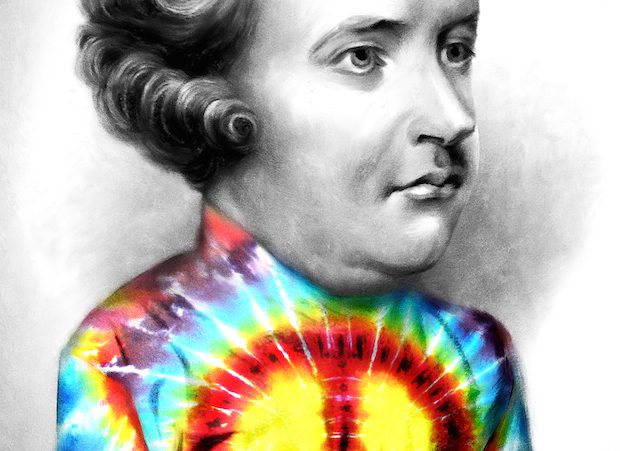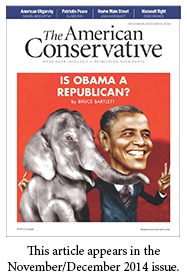Occupy Edmund Burke

David Bromwich’s monograph proposes to answer the question: “What did it mean to think like Edmund Burke?” For John Morley and the Victorian Whigs, thinking like Burke meant thinking like a cool, calculating utilitarian. For Russell Kirk and the so-called New Conservatives of the 1950s, Burke was a Christian Romantic—a principled defender of the “moral imagination” of the West against its secular assailants. In the late ’90s, Luke Gibbons and Uday Mehta summoned Burke as a critic of 18th-century imperialism and a defender of the dispossessed peoples of India and Ireland.
More recently, a series of new biographies set out to resurrect his reputation as the father of modern conservatism. In Jesse Norman’s Edmund Burke: The First Conservative, we see him as a reform-minded statesman, a free-marketeer, and a critic of the French revolutionaries’ utopian schemes. Drew Maciag presents him as a champion of civil society, patriotic allegiances, and the moral and political wisdom handed down over the ages. And in Yuval Levin’s The Great Debate, Burke and his arch-nemesis, Thomas Paine, are held up as the authors of present-day conservatism and liberalism, respectively.
But in The Intellectual Life of Edmund Burke, Bromwich has little use for this recent scholarship. The Sterling Professor of English at Yale University informs us that “no historian today would repeat the commonplace that Burke was the father of modern conservatism.” Burke the Christian, Burke the Romantic, Burke the market capitalist—all of these are conspicuously absent from his study. The reasons are not mysterious. Bromwich is a man of the left—he is on the editorial board of Dissent—and he thinks that Burke has something important to offer his allies. Saying what this is involves a good deal of ground clearing.
Bromwich picks his terrain carefully. The Intellectual Life of Edmund Burke turns our attention away from Burke’s critique of the French Revolution—fertile ground for his conservative interpreters—and towards the less-studied years of his early career. Beginning with Burke’s upbringing and education in Ireland, Bromwich follows him as he emigrates to England and begins a short-lived career as a man of letters in the 1750s. This brief period gave rise to his Vindication of Natural Society and his Philosophical Enquiry Into the Origin of Our Ideas of the Sublime and Beautiful, two dense works in which Burke sought to explain the complex relations between art and morality, beauty and fear, human nature and social convention. Bromwich is a literary critic rather than a historian, and his prowess as an interpreter is on clear display as he leads us through Burke’s difficult yet rewarding arguments.
After a rich discussion of Burke the philosopher, Bromwich considers his entry into politics. Here we see Burke as the British Parliament’s foremost critic of royal prerogative, as a steadfast defender of American Independence, and as an important strategist for the Rockingham wing of the Whig party. Along the way Bromwich unpacks Burke’s Thoughts on the Present Discontents, in which he defended organized parties as an essential check on executive power, and gives us a sympathetic account of Burke’s intransigent, oft-maligned opposition to George III. (Bromwich is at work on a second volume that will examine Burke’s career from the end of the American War through the French Revolution. For a less literary, more historical take on Burke, readers can look forward to Richard Bourke’s biography forthcoming from Princeton University Press.)
Throughout his narrative Bromwich keeps the Reflections on the Revolution in France in view, but he is keen to resituate Burke’s critique of the revolutionaries’ ideology within the context of his earlier writings and speeches. The result is a Burke that is significantly more liberal—and more republican—than recent interpreters have acknowledged. As a corrective, this is a welcome addition to the literature. Eschewing the stale conservative categories that have too often limited historians’ appraisals of Burke, Bromwich gives us something much closer to an exegesis. Through close examination of Burke’s writings and speeches, he extracts and distills the complex, varied, and sometimes discordant elements of Burke’s worldview. The individual chapters of Bromwich’s book can feel disjointed at times. But his insights as an interpreter are invariably rewarding, and they constitute the real strength of this study.
Yet Bromwich does not intend The Intellectual Life of Edmund Burke to be just a corrective. He is out to discover a new Burke, one that has been occluded in the recent scholarship but that offers lessons for contemporary politicians. In this respect his study is at best tendentious and at worst misleading.
According to Bromwich, Burke’s importance must be understood in terms of a theological crisis in the late 18th century. This was, Bromwich tells us, the crisis of “secularization.” In the old Thomist view of politics, the state was a practical extension of the moral law. But in Burke’s day, Bromwich explains, this vision of politics had become increasingly untenable. In its absence, what arguments could be levied against the Machiavellian image of politics as an amoral arena in which statesmen recognize only the dictates of power and prestige? If statesmen are to obey gods higher than the will to power or the logic of the market, then in the wake of religion’s collapse a new justification for political morality is needed. This is what Bromwich thinks he has found in Burke.
Again and again Bromwich repeats Burke’s mantra that “the principles of true politics are those of morality enlarged, and I neither now do nor ever will admit of any other.” For Burke, he argues, political morality was grounded in the natural human ability to empathize with one’s fellow man. Rather than divine command, Burkean morality is based on human psychology:
Burke believed that secularization had increased, was increasing, and could not be reversed. He devoted none of his energy to programmatic efforts to reverse the process. He supposed that enlightenment, properly understood, was the name for the development by which we move from fear of God to fear of man. This change … entails a displacement of religious by moral authority and the accompanying intuition that the idea of the good is prior to the idea of God.
Burke’s politics, according to Bromwich, acknowledged no bounds of race, creed, or language: instead he was animated by a cosmopolitan desire for “common good of humankind.”
As a philosophical account of morality, this may or may not be plausible. But as an answer to Bromwich’s question—what did it mean to think like Burke?—it is predicated on a bald-faced anachronism. As anyone familiar with 18th-century British culture will acknowledge, none of Burke’s peers—not even Tom Paine or Joseph Priestly—were, by our standards, secular. There were efforts to rationalize and demystify Anglicanism, surely, but not even the harshest critics of the established church hoped to generate a post-Christian account of morality. There were secular moralists in France, of course, but these were the exact radicals Burke excoriated in his Reflections. To suggest that he embraced “secularization” in 18th-century Britain is like arguing that Plato was a Christian or that Machiavelli was a neoconservative. The option was just not on the table.
Bromwich’s interpretation of Burke as a political moralist grows even stranger when he begins to speculate about what Burke would say to our present-day politicians. Take just two examples. At one point, Bromwich argues that “in politics as in morality, the means must justify themselves. Means, though it troubles us to think so, always alter the character of the actor.” As a description of Burke’s moral compass, this is plausible enough. From this premise, Bromwich goes on to infer that as a matter of principle Burke would have opposed the torture of terror suspects under the Bush administration. It is perhaps not coincidental that Bromwich has himself written at great length on this very subject.
Elsewhere, he explains that in a secularized world, men cannot be the judges of their own actions. Once God no longer serves as a sovereign moral judge, the consensus of one’s peers must act as an ersatz source of authority. This means, Bromwich surmises, that Burke would have supported something like the modern United Nations. “If there is a later development that one can say with confidence that Burke would have favored, from clear, unmixed, and unmistakable hints in his writings on every subject, that development is the rise of a body of international laws to civilize the conduct of nations.”
Taken as vague injunctions, Bromwich’s prescriptions are well and good: means and ends must cohere, yes, and absolute power must be checked. But the highly stipulative conclusions that he draws from them—that Burke anticipated 20th-century multilateralism or that he can help us address the moral dilemmas of the war on terror—give off a strong impression that Bromwich is telling us more about his own politics than Burke’s. The ex cathedra tone in which he asserts, without evidence, that Burke was “a doubter through and through” does little to quiet this feeling. And the frequent bait-and-switch tactic of moving from, say, the Wilkes riots in the 1760s to Occupy Wall Street—Bromwich argues that since Burke defended the former he would have supported the latter—tends to spoil what are otherwise genuinely insightful passages in his study. 
Too often, historians and political theorists treat Burke as little more than an avatar for advancing their own agendas. In this sense, it is hard to blame Bromwich from recoiling at the conservative readings of Burke that have predominated in recent years: it is indeed disingenuous to paint him as a laissez-faire capitalist or as an apologist for Western Christendom, and Bromwich is right to disavow these over-determined interpretations. As a critical reader, he is quite good at attempting to understand Burke on his own terms. But when he turns away from exegesis, in order to tailor a Burke for the contemporary secular left, does Bromwich not fall into the same trap as his rivals? The challenge and the promise of reading Burke is that he upends the hackneyed categories that frame modern political discourse. Giving us a Burke in Bromwich’s image, The Intellectual Life of Edmund Burke leaves this promise unrealized.
Jonathan Green is a doctoral student at the University of Cambridge, studying Burke’s reception in 19th-century Germany.
Comments